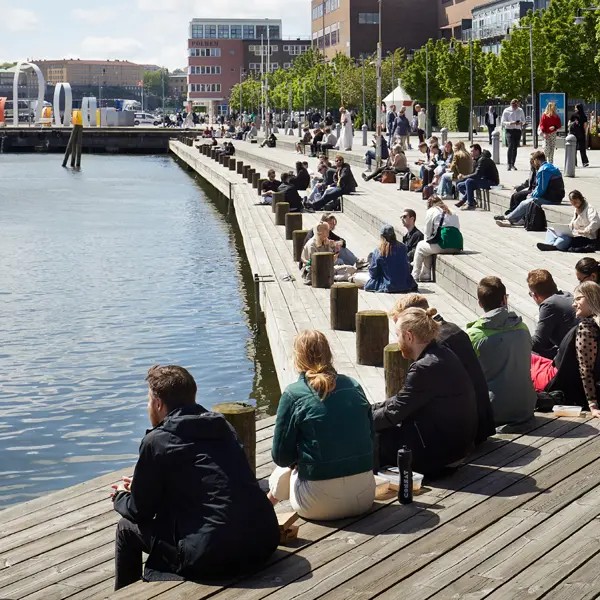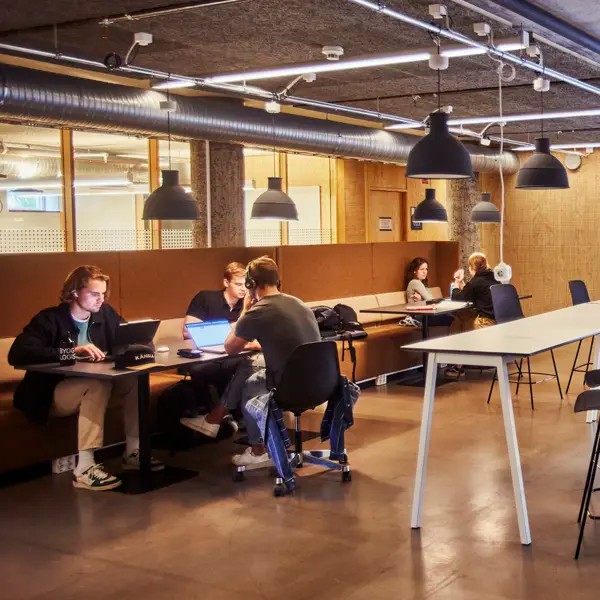
This is a blog post written by Dila, one of Chalmers' international students.
More Than I Expected: The Inclusivity I Found at Chalmers
Before moving to Sweden, I had some ideas about what life here might be like. I imagined colder winters, a different pace of life, and a certain cultural distance. I knew my program would be diverse, but I hadn’t fully thought about how all the small interactions, how people communicate, how learning happens, and how differences are approached, would shape my experience. Looking back, what has stood out the most isn’t something visible at first glance. It’s the quiet, genuine sense of inclusivity that seems to be part of everyday life here.
When I first arrived in Sweden, I caught myself wondering if I might stand out. I used to feel eyes on me, thinking people might notice that I don’t look like I am from Sweden. But over time, I realized that diversity is part of daily life here. People are used to meeting others from all around the world, and it doesn’t feel out of place at all. That openness shows in small moments, like asking a question in English or ordering something, where people respond kindly, often with a smile. Those tiny interactions slowly replaced that initial self-consciousness with a sense of comfort and ease.
Diversity is part of daily life here
That openness carried over into daily life in Sweden, too. My friends invited me to join in so many Swedish traditions, Midsummer, the crayfish party, Halloween, Christmas, all of which were completely new to me. What touched me was that they didn’t assume I wouldn’t know or care about these things; they wanted to share them with me. They explained, included, and made sure I felt part of it. Experiencing those moments firsthand made me see that inclusivity isn’t just about being accepted; it’s about being invited to truly participate, to learn, and to celebrate together.
Over time, my friendships within the program became one of the most meaningful parts of my experience. During the summer break, I traveled with three of my classmates, one Estonian and two Swedish to visit the Estonian one in their home country. A year earlier, I hadn’t known any of them, and suddenly there we were, spending time together in Estonia for our vacation, discovering a new culture through one of our friends. It was such a beautiful mix of backgrounds, three different cultures, three different perspectives, yet everything felt so natural. We were all genuinely curious and open to one another’s worlds, and that made me realize how easy connection can be when everyone approaches it that way.
Less formality makes ideas flow more freely
I also started to notice how hierarchy works differently here. In Türkiye, we often address teachers formally, Miss X, Mister Y, which adds a certain distance, even if it’s unintentional. Here, everyone uses first names, and that changes everything. It doesn’t take away respect; it just makes communication easier. You don’t overthink how to approach someone or whether you’re being too formal. It creates an atmosphere where ideas can flow freely, and where you feel your voice actually matters. It also made me realize how language itself can shape hierarchy and confidence, often without us even noticing it.
An environment of mutual respect and curiosity
The diversity I had expected in my program turned out to be even more meaningful once I experienced it. Working with people from such different backgrounds has been one of the most enriching parts of being here. Group projects aren’t just about finishing tasks; they become spaces to listen, exchange perspectives, and challenge your own ways of thinking. Even when opinions differ, everyone’s ideas are taken seriously, and that creates an environment of mutual respect and curiosity.
All these small experiences, the kind responses, the friendships, the approachable teachers, the mix of perspectives, build up something much larger. Inclusivity here isn’t something that needs to be declared; it’s something you quietly live through every day. You feel it when people listen, when they invite you in, and when you can share your thoughts freely without worrying about being misunderstood or out of place.
Looking back, I realize I hadn’t expected these subtle things to have such a big impact. But they do. They shape how you see others, how you communicate, and how you participate. Being part of this community has changed how I understand inclusion; it’s not about blending in, but about being welcomed as you are. And that’s something I’ll carry with me long after this experience.
/Dila
Read more blogs and chat with a student
Meet our international student ambassadors, and your new buddies! The Chalmers buddies can answer questions regarding the programme they pursue, the courses they have taken, student life and more, all based on their personal experience.

Connect with a Chalmers student
Read more blog posts from our international students or ask your questions directly in a chat.
Questions our students get asked a lot
You can always reach out to our students ambassadors with your questions. Below are the answers to some of the most frequently asked questions.
Get a master's degree from Chalmers
Master's programmes at Chalmers University of Technology last two years, are taught in English and are worth 120 ECTS credits. Upon completion of studies, you will be granted a master’s degree, MSc.

Master's studies
Qualify for a global career with a master’s degree from Chalmers University of Technology. We offer master's programmes in engineering, architecture and technology management and you’ll be right at the cutting edge of your field, taught by people who are highly active in both research and industry.



